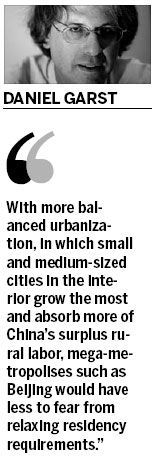
Two months ago, some Chinese newspapers published an editorial urging that the hukou, or residency permit, system be scrapped immediately. The editorial said the policy was not only unjust, but acted as a drag on China's economy.

There is certainly much to dislike about China's long-standing internal registration rules. To start with, they arbitrarily divide Chinese citizens into two categories, urban and rural, not according to where they live, but on a hereditary basis.
While rural people can now migrate to cities in search of better job opportunities, they still face significant discrimination after leaving their countryside hukou zones.
Even if they complete the bothersome paperwork needed for a temporary residence permit, their children are denied free primary and middle school education. Many of these kids are left in their villages, under the care of grandparents and other relatives, creating significant strain on families.
These provisions also apply to urban hukou holders migrating between cities. But unlike rural laborers crowding Beijing's construction sites, these migrants have an easier time paying school tuition fees. And Beijing hukou holders living outside Haidian think nothing of doing that so their children can attend one of its famous primary and middle schools.
However, all rural and most urban hukou holders face similar limitations in getting their children into China's best universities, three of which are in the capital. Beijing and other provincial cities have disproportionately large admission quotas for these schools. Thus children with Beijing hukou have an edge in getting into Peking, Tsinghua and Renmin universities.
While having an urban hukou would be advantageous for rural migrants, recent surveys, including one conducted by Renmin University, show that large numbers of them would refrain from getting one, even if given the opportunity. Rural registration gives these people land-use rights in their home town, providing them with an important safety net.
In addition, the one-child policy is more loosely enforced in the countryside. And a recently introduced scheme provides subsidized healthcare for rural hukou holders. The small annual contribution rural hukou holders pay for this program is much smaller than the money city-dwellers cough up for urban health insurance.
But several million of Beijing's residents lack a Beijing hukou, with many not bothering to register at all. Having just half of these people take advantage of a liberalized registration regime would really stress the capital's schools and other social services.
For example, the city of Fenghua, in eastern Zhejiang province, gave 13,000 select rural hukou holders an urban hukou for eight months in 2001-02. This led to the immediate loss of the $2.6 million in extra school fees these residents paid to the city, severely straining the municipal education budget.
Fenghua authorities had to scramble to find ways of funding all the social benefits these new citizens required. Here and in other provinces, cities had to suspend hukou reform programs because they were unable to handle the resulting population increase.
Thus even a highly controlled hukou liberalization program in Beijing would place huge burdens on the city's schools. And reforming the system in a limited and selective way raises troubling fairness issues. Why grant just some people a Beijing hukou while denying it to many others?
Moreover, in the likely event that such a move served as a magnet for further rural migration, it would create other problems. These new residents would further crowd the city's already jam-packed buses and subways, and increase the demand for its limited supply of cheap housing.
Finally, one wonders how Beijing's ecosystem can accommodate large numbers of new inhabitants. The city suffers from an acute water shortage and adding another million or so people would make this critical situation even worse.
The main factor driving migration to Beijing and Chinese coastal cities has been uneven economic development, with rural areas, particularly in the west and interior, lagging the rest of China. Fortunately, these areas are finally beginning to catch up.
More and more factories are moving out of Guangdong to western China, lured by lower labor costs. And the Chinese government's recent efforts to improve transportation links in peripheral regions have made it more feasible to build manufacturing plants in such places.
If this trend continues, the hukou system could in the not-too-distant future be allowed to die a natural death. With more balanced urbanization, in which small and medium-sized cities in the interior grow the most and absorb more of China's surplus rural labor, mega-metropolises such as Beijing would have less to fear from relaxing residency requirements. That would be a win-win for everyone in China.